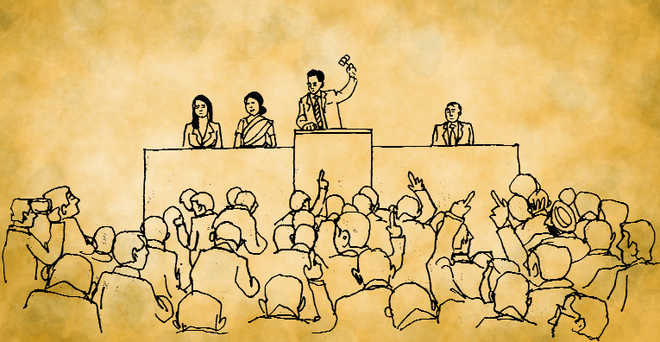
Sandeep Dikshit
IN the coming days, the czars of the telecom sector, from Sunil Mittal to Ratan Tata, are bound to cruise to Raisina Hill to seek Prime Minister Narendra Modi's indulgence. Each of their companies, virtually the who's who of the communication world, is burdened under an enormous debt. They were all willing victims of the Modi government's zeal to wring maximum money from the auctions of telecom spectrum. The companies were in a do-or-die situation. They would have had to stop their mobile operations had they not participated in the auctions to renew their spectrum.
The new government was taking office with a landslide victory that had been abetted by the then Comptroller and Auditor General (CAG) Vinod Rai's staggering indictment of the UPA government in allocating coal mines and spectrum. Television scrolls and newspaper headlines screamed of the UPA government being culpable for a loss of Rs 1.86 lakh crore. For effect the number of zeroes in the presumptive loss — nine in all — were splashed in bold print across the front pages of the crusading newspapers of that time.
If this blow to the knees was not enough, the CAG matched his sensationalist loss figures in coal mining. This time it was the notional loss in 2G auctions. Being given on a first-come-first-served basis, the then Communications Minister blundered badly by foreclosing the process, thus unfairly keeping out companies that may have wanted to apply just before the scheduled closing.
What are these analogies to do with the woes of telecom companies? And they may shortly be followed by the coal mine companies. Auction of public goods has always been a controversial process. The balancing of greater common good vis-a-vis maximisation of gains in revenue terms is always a fraught term. But when Mr Rai claimed that 2G had cost the (UPA) government, and by implication we the people, Rs 1.76 lakh crore in lost taxes, he was making a strong case for simple auctions.
The BJP cottoned on to his observations, twisted them slightly and made them into a campaign issue. India Inc happily went along on the presumption that they were going to reap a windfall anyway from the Modi government in the form of stepped-up expenditure and an easier business climate, including relaxed land-allotment norms.
Except for the simple-minded, this meant that when distributing access to natural resources, public good should be enhanced to the maximum. Public good, with the help of Vinod Rai's crusading zeal, now stood only for maximising government revenues through auctions. It flew against the Supreme Court's observation that "perhaps" an auction was "the best method" of ensuring a fair allocation of natural resources and protection of public interests.
When the Modi government tried to follow that prescription, it garnered good headlines for the first few days. But it soon found itself at the deep end. The recent spectrum auction saw a commitment that touched just 25 per cent of the targeted Rs 40,000 crore. The coal block auction yielded a promise of Rs 2.07 lakh crore in revenues, royalties and upfront payments. Telecom spectrum auctions in 2015 and 2016 promised an eye-popping Rs 1.75 lakh crore.
In other words the Modi government had beaten the UPA hollow in maximising public good by collecting IOUs for Rs 3.82 lakh crore. Very little money actually flowed in. These were promises of enriching the central exchequer when the operations got underway in coal mines and on annual basis by telecom companies. The coal sector is now tottering. As many as 11 companies with 14 coal blocks under their belts are financially stressed. Of them, three are among the RBI's list of dirty dozen that owe stupendous amounts to the banks and must be put on sale. The telecom industry is groaning under a Rs 5 lakh crore debt according to its association and Rs 7 lakh crores, if the banks' version is to be believed. Undeterred, the government has gone in for the auction of 67 small oil and gas field that is projected to net Rs 70,000 crore.
The telecom companies are first off the block. They are calling for doubling the deferred payment period for the spectrum, a lower interest rate on loans and permission to put up spectrum to be used as collateral for loans. All of these amount to gross post-auction changes and could even earn the government a moral rap on the knuckles from the courts if it entertains the idea.
The Modi government had been hoping that the revenue from the coal and telecom auctions would expose the corrupt ways of the UPA government. Pure auctions have never been fool-proof for they can be affected by any of the four factors: (i) rigged technical standards to qualify (ii) cartelisation (iii) aggressive bidding that makes the asset no longer worth the amount paid for and, (iv) unexpected, post-auction deterioration of asset quality.
Having taken a shrill moral stand when the UPA government was handling the auction of natural resources, the Modi government may soon find that it will hardly have any elbow room for flexibility when the coal and telecom companies begin sending distress messages.



























